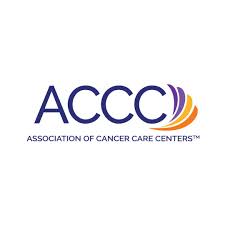- Center on Health Equity & Access
- Clinical
- Health Care Cost
- Health Care Delivery
- Insurance
- Policy
- Technology
- Value-Based Care
Kent Hospital MPN Initiative Focuses on Supportive Care
Besides Kent Hospital, the Association of Cancer Care Centers worked with Perlmutter Cancer Center at NYU Langone Hospital and Charleston Area Medical Center Vandalia Health in Charleston, West Virginia.
Learning to be better listeners, as part of formalized approach to patient communication and support, paid dividends in better adherence to treatment and other improvements among patients with myeloproliferative neoplasms (MPNs) at Kent Hospital in Kent County, Rhode Island, according to a summary published by the Association of Cancer Care Centers (ACCC).1
ACCC logo | Image credit: ACCC

Over a 3-year period ending in 2024, ACCC implemented its Advancing Care for Patients with Myeloproliferative Neoplasms: Quality Improvement Program, with twin goals of promoting best practices in management of patients with MPNs and allowing its partner institutions to develop actionable quality improvement plans over a 6-month period.
Besides Kent Hospital, ACCC worked with Perlmutter Cancer Center at NYU Langone Hospital and Charleston Area Medical Center Vandalia Health in Charleston, West Virginia. ACCC published summaries of each institution’s experience on its website as well as an overview of the program and the MPN landscape. A previously published report focused on Perlmutter’s experience.
Kent Hospital’s MPN Initiative
Supportive Care is an essential component of MPN care management; in fact, the results of the ACCC Quality Improvement Program were presented in an abstract at the meeting of the Multinational Association of Supportive Care in Cancer, held in Lille, France.2
In a summary of the Kent Hospital experience, officials said the institution serves the highest population areas of the state, with cancer services delivered by a multidisciplinary team. The facility features a 29-bed inpatient oncology unit and 11 infusion stations.
Using the ACCC program as its guide, Kent Hospital implemented changes to its MPN education and support program. A clinician at the hospital served as the point person for the program. Over 2 years, the hospital treated 260 patients with MPNs across all 3 major subtypes: polycythemia vera (PV), essential thrombocythemia (ET), and primary myelofibrosis (MF).
Referrals to physical therapy to help patients with MPN cope with fatigue are part of a supportive care program. | Image credit: Pexels

At the outset, a multidisciplinary Kent hospital team took part in an ACCC webinar featuring Sarah Everette, MSW, LCSW, oncology social worker at Baptist Health, Louisville, Kentucky; and Andrew Kuykendall, MD, Department of Malignant Hematology, Moffitt Cancer Center, Tampa, Florida. The webinar covered issues such as diagnostics, risk stratification, treatment options, clinical considerations for PV, ET, and MF, symptom management, and supportive care. Kent implemented the use of validated tools to assess psychosocial stress and financial hardship.
Focus on supportive care. During an initial visit with each patient, the Kent Hospital point clinician provided education and support and asked open-ended questions to better understand and assess each patient’s understanding of their condition; this process allowed the hospital to identify each patient’s needs. As needed, patients were connected with social workers, nutritionists, pharmacists, or physical therapists to address issues such as fatigue.
Patients were also connected with resources provided by the Leukemia and Lymphoma Society. Previously, no process existed for connecting patients with these external education materials and resources.
From this process, the summary states, “the provider developed an individual quality improvement plan to educate all patients about MPNs at each visit. At the end of 6 months, the provider facilitated 1-on-1 education sessions to approximately 60 patients and supplied supporting educational materials.”
Following the ACCC program has made a difference. The clinician stated: “I think that I’ve started listening more, giving my patients more time to talk. Since starting this project, I’ve observed my patients being very receptive and positive in terms of the information I’ve provided them. I’ve noticed improved adherence with [taking] medications, [with] getting blood work done, and [with] making lifestyle changes—like exercising more and working on quitting smoking.”
The clinician added: “The one-on-one education materials have really helped. Plus, for me, I have bonded with my patients more than anything else.”
References
- Advancing care for patients with myeloproliferative neoplasms. Association of Cancer Care Centers. Accessed January 12, 2025. https://www.accc-cancer.org/home/learn/cancer-types/hematologic-malignancies/advancing-care-for-patients-with-myeloproliferative-neoplasms
- Everette S, Huynh-Lu J, Kuykendal A, et al. Advancing care for patients with myeloproliferative neoplasms. Presented at: MASCC-AFSOS-ISOO 2024 Annual Meeting, Lille, France; June 27-29, 2024.
